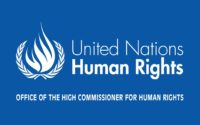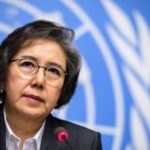Myanmar: UN Human Rights Expert Pleads for Rohingya Returns to Stop, Fears Repeat Abuses May Await
ASIA-UPDATES ON MYANMAR ROHINGYA GENOCIDE, UNITED NATIONS, 12 Nov 2018
UN High Commissioner for Human Rights – TRANSCEND Media Service
 6 Nov 2018 – A UN human rights expert has implored Bangladesh to shelve plans to start repatriating Rohingya refugees to Rakhine State this month, saying the Myanmar Government had failed to provide guarantees they would not suffer the same persecution and horrific violence all over again.
6 Nov 2018 – A UN human rights expert has implored Bangladesh to shelve plans to start repatriating Rohingya refugees to Rakhine State this month, saying the Myanmar Government had failed to provide guarantees they would not suffer the same persecution and horrific violence all over again.
“I have not seen any evidence of the Government of Myanmar taking concrete and visible measures to create an environment where the Rohingya can return to their place of origin and live there safely with their fundamental rights guaranteed,” said Yanghee Lee, the Special Rapporteur on the situation of human rights in Myanmar.
The Governments of Bangladesh and Myanmar agreed on a repatriation plan in December 2017, and have said they will start the process of returning hundreds of Rohingya from Bangladesh refugee camps from the middle of November.
Lee has repeatedly said that any returns before the root causes of the crisis were dealt with was highly premature and unjust. She has received credible information from the refugees in Cox’s Bazar that they are in deep fear of their names being on the list to be repatriated causing distress and anguish.
“Not only did the Rohingya face horrific violence at the hands of security forces in 2016 and 2017 with no accountability, they have been subjected to decades-long systematic discrimination and persecution in Myanmar,” the Special Rapporteur said.
Lee reiterated that the refugees must be given the opportunity to participate in the process, as it was their decision alone to return to Myanmar. “Any returns under current conditions where there is high risk of persecution, may violate obligations under customary international law to uphold the principle of non-refoulement,” she added.
The Government of Myanmar has reportedly been developing the area from which the Rohingya fled, but building some physical infrastructure to house returnees does not resolve these issues, stressed the Special Rapporteur.
“Living safely and in a dignified manner includes a right to citizenship, freedom of movement, and access to services, health, education and livelihoods,” Lee said.
“I urge the Governments of Bangladesh and Myanmar to halt these rushed plans for repatriation, to ensure the protection of the Rohingya refugees and to adhere to their international human rights and refugee law obligations to ensure any returns are safe, sustainable, voluntary and dignified.”
*******************
Prof. Yanghee Lee (Republic of Korea) is the Special Rapporteur on the situation of human rights in Myanmar and has held that mandate since 2014. Ms Lee has a B.S. Degree from Georgetown University, M.ED. and Ph.D. from University of Missouri-Columbia, and is a professor at Sungkyunwan University. She is highly recognized nationally, regionally, and internationally for her expertise in human rights and served as member (2003-2013) and chairperson of the Committee on the Rights of the Child (2007-2011). She has also served as chairperson of the Meeting of Chairpersons of Treaty Bodies (2010-2011) and more recently chaired the Coordination Committee for Special Procedures (2016-2017). Ms Lee currently serves on the Advisory Committee of the National Human Rights Commission of Korea. She is the founding President of International Child Rights Center. In 2009, she received the Order of Civil Merit, the highest recognition given to a civilian for her work in human rights.
The Special Rapporteurs are part of what is known as the Special Procedures of the Human Rights Council. Special Procedures, the largest body of independent experts in the UN Human Rights system, is the general name of the Council’s independent fact-finding and monitoring mechanisms. Special Procedures mandate-holders are independent human rights experts appointed by the Human Rights Council to address either specific country situations or thematic issues in all parts of the world. They are not UN staff and are independent from any government or organization. They serve in their individual capacity and do not receive a salary for their work.
For media inquiries related to other UN independent experts please contact: Jeremy Laurence (+41 22 917 9383 / jlaurence@ohchr.org)
This year is the 70th anniversary of the Universal Declaration of Human Rights, adopted by the UN on 10 December 1948. The Universal Declaration – translated into a world record 500 languages – is rooted in the principle that “all human beings are born free and equal in dignity and rights.” It remains relevant to everyone, every day. In honour of the 70th anniversary of this extraordinarily influential document, and to prevent its vital principles from being eroded, we are urging people everywhere to Stand Up for Human Rights: www.standup4humanrights.org
DISCLAIMER: The statements, views and opinions expressed in pieces republished here are solely those of the authors and do not necessarily represent those of TMS. In accordance with title 17 U.S.C. section 107, this material is distributed without profit to those who have expressed a prior interest in receiving the included information for research and educational purposes. TMS has no affiliation whatsoever with the originator of this article nor is TMS endorsed or sponsored by the originator. “GO TO ORIGINAL” links are provided as a convenience to our readers and allow for verification of authenticity. However, as originating pages are often updated by their originating host sites, the versions posted may not match the versions our readers view when clicking the “GO TO ORIGINAL” links. This site contains copyrighted material the use of which has not always been specifically authorized by the copyright owner. We are making such material available in our efforts to advance understanding of environmental, political, human rights, economic, democracy, scientific, and social justice issues, etc. We believe this constitutes a ‘fair use’ of any such copyrighted material as provided for in section 107 of the US Copyright Law. In accordance with Title 17 U.S.C. Section 107, the material on this site is distributed without profit to those who have expressed a prior interest in receiving the included information for research and educational purposes. For more information go to: http://www.law.cornell.edu/uscode/17/107.shtml. If you wish to use copyrighted material from this site for purposes of your own that go beyond ‘fair use’, you must obtain permission from the copyright owner.
Read more
Click here to go to the current weekly digest or pick another article:
ASIA-UPDATES ON MYANMAR ROHINGYA GENOCIDE:
- India Must End Arbitrary Arrest, Detention, and Forced Returns of Rohingya Refugees
- Myanmar’s War Has Forced Doctors and Nurses into Prostitution
- Six Years After Their Darkest Hour, the Rohingya Have Been Abandoned
UNITED NATIONS:
